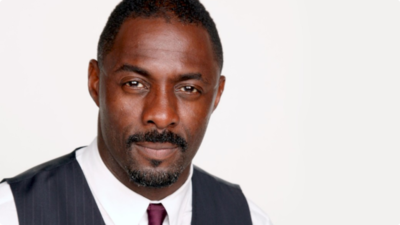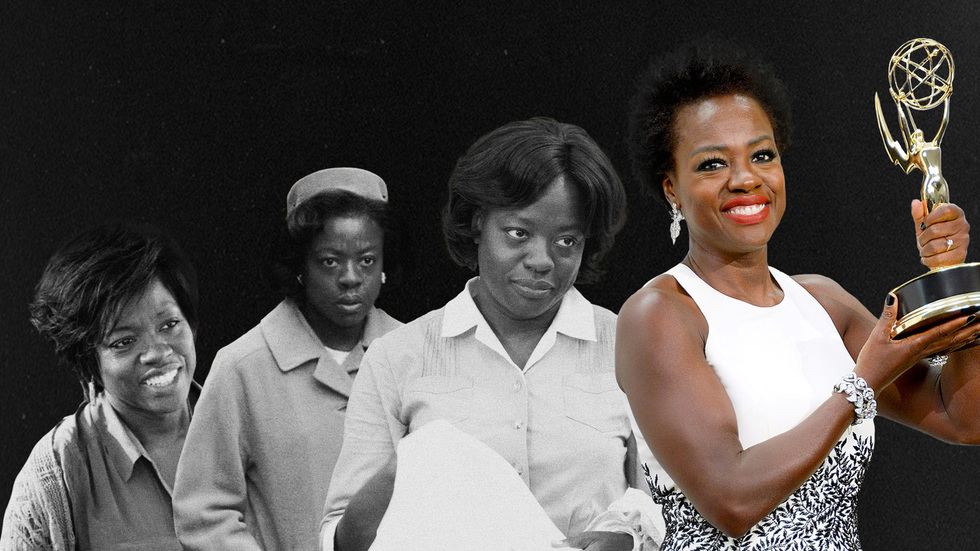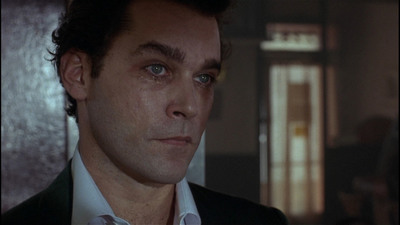
BY MATTHEW ENG |
Viola Davis Isn't an Oscar Winner Yet — But She Should Be
A deep-dive into the cinematic offerings of the recent Emmy winner and redoubtable acting titan.

Before winning her history-making Emmy this past Sunday and delivering what may be the most commanding speech ever heard in the telecast’s 66 years, Viola Davis won a richly-deserved Oscar.
Okay, not exactly… Earlier in the show, Davis was misidentified as an “Oscar winner” by a bottom-of-the-screen teaser, which was essentially salt in the wound of those who are still smarting over Davis' Oscar loss in 2011.
I, like many, went into the 2011 Oscars fully expecting to see Viola Davis rightfully hold a Best Actress Oscar that she and she alone had won, a victory that seemed to be all but unannounced in the moments leading up to the award’s presentation. After all, Davis had done well enough during the precursor awards season leading up to the Oscars, during which she took home the highly-important SAG Award, an honor she received amidst a unanimous standing ovation from a roomful of her peers and which only seemed to solidify her as a mortal lock for the Oscar. Even more importantly, she had survived and often been spared from the continually scathing — if not unfounded — backlash that The Help, a film about African-American maids in Jim Crow South, had received in the months between its August release and the February ceremony.
Throughout the ceremony, I thought about the rapturous standing ovation she’d surely receive, the touching speech she’d deliver, and — best of all — the all-around better scripts she’d read, roles she’d play, and films she’d be a part of with a little help from Oscar, which, for better and worse, remains the strongest symbol of industry respect and admiration, the most concrete indicator of “talent” within the entertainment world. Winning an Oscar could and surely would work wonders for the career of a performer like Viola Davis, a name that audiences have only really become familiar with within the past five years. Before she decamped to Shondaland, Davis remained perpetually on the brink of larger film stardom, a plain she had reached solely on the basis of her own remarkable talent.
I’ll never forget the look of almost embarrassed surprise on the legendarily expressive face of Meryl Streep, when it was her name that was called by presenter Colin Firth. Although they were routinely positioned as each other’s fiercest competition that year, Streep and Davis — co-stars in 2008’s Doubt — spent the awards season perfecting the art of the generous acceptance speech shout-out. Streep ended her Golden Globes speech that year by telling Davis, “I love you, Viola. You’re my girl.” At the SAG Awards, Davis singled out Streep for serving as a source of inspiration during the former’s difficult training at Julliard from 1989 to 1993. And before she took the stage to deliver one of her typically warmhearted, self-effacing speeches, Streep bypassed the standing, cheering masses and made a beeline right for Davis, embracing her “competitor,” about whom Streep had emphatically declared, “My god, somebody give her a movie!” during her SAG acceptance speech for Doubt three years ago. It’s telling not only of the camaraderie and mutual respect of this A-list friendship but also of Davis’ character that she was first to rise out of her seat upon hearing Streep’s name, right at the moment that it became painfully clear that Davis was still on the brink of stardom.

Of course, The Help wasn’t Davis’ first date with Oscar. She received a Best Supporting Actress nomination prior to this, in 2009, for her breakthrough though not exactly star-making performance in Doubt, the film adaptation of John Patrick Shanley’s Pulitzer-winning play. Before this, Davis had made a name for herself on the Broadway stage, receiving two Tony Award nominations for Best Featured Actress in a play, winning one in 2001 for her performance as Tonya in August Wilson’s King Hedley II. Like all New York theater actors, Davis found steady if not particularly fulfilling work on TV, where she was featured regularly, recurrently, but most often sparingly on shows both hugely popular (a CSI role here, a Law and Order gig there) and quickly forgettable (City of Angels or Century City, anyone?). She crafted out a type for herself on the small screen, often playing background professionals with career-minded names, i.e. “Nurse Lynnette Peeler,” “Detective Parker,” or even just “Suzanne Clemons’ Attorney.” Like her characters, Davis was there to just simply do her job, not steal focus.
On the big screen, Davis didn’t fare much better. Unimaginative casting directors saddled Davis with brief, exceedingly thankless parts that are more along the lines of job titles than they are actual characters: “Policewoman,” “Social Worker,” “CIA Chairwoman,” among others. Davis worked regularly throughout the early to mid-aughts, but rarely in larger capacities than the richly substantial but never more than supporting roles she was given by the likes of Steven Soderbergh in his commercial sci-fi misfire Solaris (below) and Denzel Washington in his directorial debut, the biopic Antwone Fisher, as, respectively, a space station crew member and the title character’s estranged, ex-con mother.

Although the roles were often flimsy, Davis was slowly building her reputation as a reliable, low-key character actress, one who could be depended on to bring something more to roles that had all but been submerged in their movies. They were characters whose inclusion in their vehicles are perfunctory at best, and yet Davis inhabits each and every part with such surprising dedication that these films often didn’t require nor deserve. I’ve written about her before, so it should come as no surprise that I think Viola Davis may be our finest working actress, or at least our most reliably fantastic. She imbues even the most aggravatingly throwaway roles with such emotional richness, so much so that it remains quite tricky to separate Davis’ terrific, multilayered performances from the stock, one-note characters she was forced to play for the better part of a decade, a mighty actress stuck in the puniest roles.
Davis deserved better and yet was powerless against a Hollywood that wasn’t and still isn’t writing the kinds of dynamic roles for women of color that had been sparse in prior decades but had at least been present. Where are the Celie Johnsons, the Rebecca Morgans, the Tina Turners, the Ruth, Lena, and Beneatha Youngers? Yes, of course we should rejoice that in the past three years television has given us Empire's Cookie Lyon, Being Mary Jane's Mary Jane Paul, Scandal's Olivia Pope, and Davis’ own Annalise Keating on How to Get Away with Murder, but why must one medium's progressiveness substitute another's? I still want to see Taraji P. Henson, Gabrielle Union, Kerry Washington, and Davis on the big screen, where actresses of their distinction and star-wattage were meant to be seen.
Yes, this year’s Emmys are a welcome sign of progress, but Hollywood still remains a fundamentally biased and artistically unobliging place for women of color, particularly those who would rather play something other than an assistant or a gal pal or a spiritual guide but who often don’t have the choice to decline. With this in mind, what else can a clearly capable but routinely neglected actress like Davis do but aim to transcend the restrictions of her roles in the hopes of turning out good work that, with any luck, someone will notice?
Thankfully, someone did eventually take notice and Davis was cast in the small but crucial role of Mrs. Miller in Doubt. And speaking of noticing, it’s a wonder how much we don’t notice just how patently the role of Mrs. Miller has been condensed and cut off, at least concretely, from nearly everything else that occurs around it in Doubt. Set in a Bronx Catholic middle school circa 1964, the film depicts a battle of wills between Streep’s Sister Aloysius, the school’s strict, steadfast principal, and Father Flynn (Philip Seymour Hoffman), the popular, charismatic priest whom she suspects of conducting an indecent relationship with Donald (Joseph Foster), a bullied African-American student. As the boy’s mother, Davis appears two-thirds of the way into the film for a meeting with Streep’s Sister, appearing after all of the key players have been established and sticking around for all of ten minutes. Mrs. Miller is a pivotal but transient device, written in to provide much-needed variation to the moral mystery at Doubt’s center. She serves an essential if not obvious function within the film, which is to weigh and remind us of both the emotional and real-world repercussions of the ethical battle being waged here for someone other than its central adversaries. It’s an abbreviated part and yet, within it, Davis somehow manages to make time stand still.
Davis’ handling of Mrs. Miller’s compact sequence in Doubt, which is essentially an extended conversation with Streep’s growingly-resolute Sister, complements and heightens the film’s fraught tone and compelling themes, while also setting the character apart from the piece’s purposely ambiguous nature and theatrical tendencies. Instead, Davis roots the character and her dilemma in something that’s suddenly, bitterly real. Sitting in Aloysius’ office, attempting to make some friendly if not uncomfortable chitchat, Davis not only communicates the unease of simply being a parent unexpectedly called in to see her son’s principal, but also the underlying context of the scene’s set-up, i.e. the inherent discomfort of merely being a sixties-era black woman sitting in a predominantly white environment, anxiously awaiting some unknown news regarding her son, the only black student in the school. Like many of Davis’ performances, the impact isn’t in what’s said or gestured outright, but rather in the smallest of details. It’s the way her face vacillates between soft and stiff, often mere seconds apart, as when her regularly calm face, prompted by earlier questions about her home life and her husband’s abusive treatment of Donald, emits a warm, almost relieved smile upon mention of Father Flynn, Donald’s sole friend in the school, only to quickly fold that smile and retreat back into guarded unease, forcing us to question just how much she herself may already suspect or know.

Although her exemplary work in Doubt received ample buzz and praise from both critics and awards bodies, Davis wasn’t invulnerable to the same casting directors who had woefully misused her before she had an Oscar nomination to her name, not to mention a widely-held consensus as the likely runner-up. Indeed, Davis’ résumé in the two years following Doubt is cluttered with the same perfunctory parts she had been given prior to that breakout role: “Mayor,” “C.I.A. Director,” and two thumbnail roles as doctors. Perhaps the one “highlight” amongst these post-Doubt roles is a part in Ryan Murphy’s Eat, Pray, Love, in which Davis is merely required to be a sounding board to the bold self-discoveries of best friend Julia Roberts. Because Davis insists, as she always does, on imbuing her BFF with more life than both the barely-there character and the film itself warrants, the truncated time we spend with her in Eat, Pray, Love is, from moment to moment, a painful reminder that Hollywood just doesn’t know what to do with its women of color, even those as evidently talented as Davis. It was as if the terrific calling card of her lauded Doubt performance had been carelessly lost in the shuffle. Doubt may have given her some eyes, but where was the film that would give this immensely deserving performer the opportunity to really take off and ascend from that brink?
Whether or not Tate Taylor’s The Help is a film that’s entirely deserving of a performer as deeply committed as Viola Davis is arguable at best. The film, based on Kathryn Stockett’s best-selling novel of the same name, follows a young, aspiring journalist who pens an anonymous exposé from the perspective of the African-American maids in her Jackson, Mississippi hometown, detailing the racism and prejudice they face while working for the town’s well-to-do white families. Davis plays Aibileen Clark, a middle-aged maid who has spent her entire life taking care of other people’s children, and who, along with her best friend and fellow maid Minny (played by charismatic Oscar-winner Octavia Spencer), serve as the initially skeptical but ultimately determined subjects of the tell-all written by Skeeter (Emma Stone), the plucky and importantly white writer.
The Help is a film pockmarked with problems of character and politics. Its major depiction of racism comes via Hilly Holbrook, a lily-white queen bee and shrieking harpy played to burlesqued excess by Bryce Dallas Howard and written with calculated menace by Tate Taylor, both entirely missing the more everyday, deeply-ingrained ways in which racial hatred tends to frequently take shape. The Help can’t seem to make up its mind about whether it wants to concentrate its structural efforts on either Stone’s typically ambitious writer or Davis’ downtrodden, emotionally repressed housemaid, even though it’s pretty clear which performance better serves the film as a whole. Additionally, Taylor hasn’t constructed a work that’s always equipped to deal with the necessary concerns regarding its supposed white heroism, writerly exploitation, and disingenuously picturesque portrait of Jim Crow-era South. It’s a project that employs several underutilized actresses of color, including, in addition to Davis and Spencer, the lovely Aunjanue Ellis, the stage actress LaChanze, and Davis' childhood inspiration, the glorious Cicely Tyson, albeit all in the roles of maids, with varying levels of importance. It’s an entertaining film, which may be a problem in itself, that nonetheless has enough moments of both decided toughness and genuine tenderness to salvage it from being mere comfort food or limousine-liberal fodder.
And yet The Help is never more challenging or fulfilling as filmmaking than when it relies on the valiant efforts of its own in-film savior: Viola Davis. To call Davis “best in show” or an “MVP” or even to say that she merely “enhances” The Help are all major understatements. Davis saves the film from its own worst tendencies, preventing it from becoming just another revisit to The Blind Side, and refusing to watch it dissolve into the downright unseemly piece of showy, feel-good pap that it could’ve easily been without Davis’ heavy and unwavering anchor. The Help is surely Davis’ film more so than it is Taylor’s or Stone’s, but it’s also “hers” much in the same way that Sophie’s Choice will always be Streep’s achievement. And similarly to Streep in Sophie, a romantically misremembered movie with one riveting performance to its name, Davis miraculously manages to give a performance that feels both in and of its inferior film, elevating its good intentions while still communicating deep-rooted authenticity and profound gravitas to the attuned audience that Taylor and Co. can only aspire to reach.

It’s worth mentioning that The Help actually marked Davis’ second time playing “the help,” the first being the character of Sybil, a fifties-era housemaid in Todd Haynes’ 2002 modern masterpiece Far From Heaven. In this updated homage to the films of Douglas Sirk, it’s the point of the piece that Davis’ Sybil be nothing more than the alert but silent observer to the budding relationship between her employer, a demure Connecticut housewife (Julianne Moore), and a compassionate black gardener (Dennis Haysbert). And yet Davis, the magician that she is, makes her presence utterly magnetic, paying homage to her actress ancestors like Juanita Moore and Hattie McDaniel, while allowing the character to briefly display the kinds of complicated emotions that both Moore and McDaniel were rarely permitted to express from behind the imposed limits of their roles. With her amazing knack for distilling something credibly authentic and emotionally specific from even the most overused, underwritten types, it’s understandable that captivated viewers might fail to realize the disconcerting quandary at hand here, which is that, over the course of a decade, two of Viola Davis’ most prestigious film roles have been as maids.
With her Emmy in tow, what might happen next for Viola Davis’s cinematic prospects? I don’t think she runs the risk of having to settle for anymore outright bad roles, which is a relief in many ways, although it’s hard not to wonder about the ways in which her career might’ve really taken off with an Oscar. I don’t know if she would have been as in-demand an actress as Halle Berry was following her landmark win in 2002. That being said, it’s also hard to imagine Davis making the same unfortunate mistakes that Berry did within the past decade, choosing unnecessary franchises and generic thrillers that made her one of the highest-paid actresses working in Hollywood but were significant flops. Like Davis, Berry has since emigrated to TV on CBS’s Extant, a move that seemed all but unforeseeable back when, just a little over a decade ago, she stood on the stage of the Kodak Theatre, Oscar in hand, declaring, “This moment…is for every nameless, faceless woman of color that now has a chance, because the door tonight has been opened," a sister speech to Davis'.
Davis’ last toplining film gig, as a vigilante mother opposite Jennifer Lopez in Lila and Eve, fizzled too quietly with critics and audiences to make waves. 2012’s Won’t Back Down, in which Davis plays a mother/teacher seeking to transform her child’s floundering inner city school and which refreshingly put her in an unmistakably lead role, garnered some premature awards speculation for Davis, due in part to Oscar afterglow. The project seemed like a perfect fit for an outspoken education advocate like Davis, who once said on The Ellen DeGeneres Show that education was her “lifeline” during a tough, impoverished childhood in Central Falls, Rhode Island. However, Won’t Back Down was met with a surprising deal of controversy by those who claimed it took a decidedly anti-teachers union stance. It went on to receive middling reviews from critics, while subsequently bombing at the box office. Davis’ other post-Help output, in fly-by YA adaptations like Beautiful Creatures and Ender’s Game and ambitious ensemble thrillers like Prisoners and Blackhat (below), tend to feature Davis in relatively more focal but nonetheless supporting capacities, a trend that’ll be blown to blockbuster capacities when she plays Amanda Waller in D.C.’s upcoming Suicide Squad movie.

It’s at least comforting to know that Davis will always have the Broadway stage to return to if she’s left unfulfilled by Hollywood, although an actress with Davis’ wide-range shouldn’t be forced to settle for one type of stardom. Broadway, which will always be a community more welcoming to actors of color, is where Davis returned in 2010, in between Doubt and The Help, to pick up a Tony by playing Rose opposite Denzel Washington’s Troy Maxson in a smash revival of August Wilson’s Fences. A long-overdue adaptation of Fences, in addition to Wilson’s full ten-play cycle, is set to be directed and produced by Denzel Washington for HBO. It’s an immensely exciting development for a playwright who has bafflingly been denied filmic treatment, but I’m sure I’m not the only one who wishes we could see Davis and Washington enact this volatile marriage on as big a screen as possible.
There are also in-the-works biopics of Harriet Tubman, whom Davis indelibly quoted in her Emmy speech, for HBO, and Barbara Jordan, the trailblazing politician who became the first African-American to be elected to the Senate in Texas. The latter project Davis announced she was developing with Tony Kushner all the way back in March of 2012 with her recently-formed production shingle, JuVee Productions. Although there hasn’t been much news on the project since then, here's hoping that both films, if and when they come to fruition, will allow Davis the rare freedom to embody two very real heroes with the remarkable three-dimensionality that are so often missing from the already sparse genre of women of color biopics. For a venture as determined as this to succeed would be a coup not only for Davis, but for all performers of color, who might heed Davis’ efforts and take it upon themselves to spearhead their own vehicles and supply themselves with the types of deliberately diverse roles and stories that too few top-flight writers and directors have any interest in providing.
In any case, the film industry desperately needs to take a page from TV and begin to sort out its ongoing racial issues and, in the process, learn how to fully utilize its actresses of color by taking chances on the sort of incomparable talents like Davis who have been kept on a tight leash for so long. After The Help, which was, most importantly in Hollywood, a wildly surprising box office victory, one would assume that studio heads, producers, and others in power would finally grasp that Denzel Washington and Will Smith aren’t the only noted actors of color who can shepherd a middle-of-the-road movie to commercial triumph and considerable awards acclaim. By all means, her recent wave of small-screen success should realistically allow Davis to finally nab the types of parts and projects that are utterly deserving of an actress whom we might long ago have deemed of the same sophisticated caliber as the Streeps, Moores, and Blanchetts of the world had she received even a handful of their tony opportunities. She remains the best thing by a thousand miles in the fallaciously addictive How to Get Away with Murder and after that forthright Emmy speech, I can’t help but keep my fingers crossed that she'll finally achieve the type of full-fledged stardom that has alluded so many of her fellow peers and pioneers.
Because Viola Davis has always been a great actress. And she has been waiting for us to realize that this is all that should ever matter.

